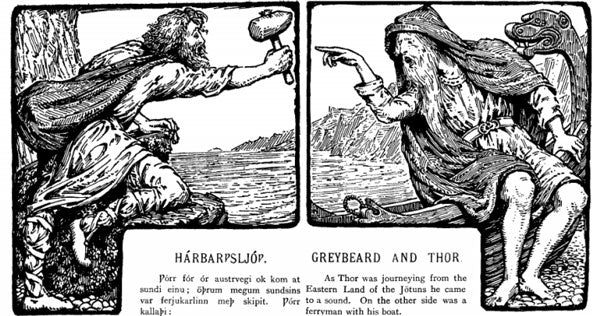🎁 Enjoy 10% off with code VIKING10
🎁 Enjoy 10% off with code VIKING10
Harbard
April 19, 2023 6 min read

As if to maintain a secret rule, all ancient mythologies mention an old sage with mysterious interventions. He appears as if by magic on the path of the hero of the story. Among the Vikings, it is Harbard, the legendary ferryman, who occupies this role. Although he is far from the stereotype of the thoughtful old man, he serves the same purpose in Norse mythology.
To this day, the origins and significance of this character are in doubt. That said, there is no shortage of theories, something we will discuss at length on today's article.
Without further ado, let's play detective and find out together who Harbard, the fantastic Viking ferryman, really is!
History and origin of Harbard

In Viking mythology, Harbard is an old wanderer. He is a ferryman who crosses the river and tells the crossers one of his many tales.
Underneath his unpleasantness and rough demeanor, he hides a great deal of benevolence and wisdom. On many occasions, he shares this knowledge anecdotally or cryptically, so that only the most deserving can enjoy it.
His name, Harbard, means "grey beard" in Old Germanic. One might think that this nickname is harmless, and that it only reflects the physical appearance of this character. Nevertheless, the choice of words is far from being anodyne, and would be a little more complex.
In reality, it is one of the nicknames attributed to the god Odin, lord of the pantheon of Nordic deities. Indeed, the ultimate deity of the Nordic pantheon is attributed a multitude of epithets, some of which are used to describe his physical appearance. This is one of the first elements that would indicate that Harbard is none other than the god Odin.
But let's not jump to conclusions! Let's first look at the other clues that could help us decide.
Harbard's intriguing adventures in Viking mythology
Harbard is the ferryman of the Elivágar. This is a group of rivers coming from Hvergelmir, which is said to be the origin of the world. In this respect, he had a very crucial mission, because he was in charge of crossing the rivers and orienting the passers-by. Several historical sources attest to these facts and open a window on this emblematic character.
The story of Harbard and the god Thor

In Germanic mythology, the story is told of the crossing of the god Thor. Back from his adventures with the giants, he called upon Harbard's services in order to cross one of the rivers of the Elivágar. Great was his surprise when this one started to provoke him.
In addition to questioning his bravery and exploits, the old man boasted of his merits, and minimized his own. At the end of their exchange, he refuses to take it and Thor leaves furious.
Here, we highlight the dichotomy of these two characters. On the one hand, we have Harbard, devious and full of himself, testing the limits of his interlocutor's patience. On the other side, we have Thor, temperamental, but faithful to his values of honorable warrior.
Legend has it that he left so abruptly that he did not even notice that it was his own father, the god Odin. Another lead that points in this direction!
The poem Hárbarðsljóð

Taken straight from the Poetic Edda, Hárbarðsljóð, which means Harbard's Lai, retells the story of Harbard with the Viking god of thunder, but with a few details. Thor intends to return to Asgard after a long stay in Jötunheimr, but everything does not go as planned.
Indeed, this time it is a more explicit quarrel, where the two characters indulge in insults and rudeness. As soon as Thor asks for his help to cross the river, Harbard retorts:
"Who is this boy of boys
Who stands beyond the strait?
He answered:
Who is that young man of the young men
Who calls across the wave?"
Although Thor is known for his anger and strong temper, he offers him a meal if he agrees to accompany him to the other side. Harbard refuses and says that he has been asked to wait for noble passengers. He then starts to criticize his appearance, to call him a vagabond and to make fun of his clothes.
Afterwards, he asks Thor what feats he was able to achieve. When he tells him about the battles he has fought with the giants, Harbard ridicules him, and talks about his many love affairs and sexual conquests. The teasing doesn't stop there, and he goes so far as to accuse his wife, Sif, of adultery.
A behavior worthy of the god of deceit and malice. Another interesting theory that we will look at below.
Harbard's appearances in the cult series Viking

Harbard, played by Kevin Durand, makes his big appearance in the famous series Vikings during its season 3. With so many events taking place, fans were not expecting such a mysterious character to make an appearance.
Even before his arrival in Kattegat, this character was already generating general intrigue. Indeed, he is first seen in a strange dream of Siggy, Helga and Queen Aslaug holding snow in a bleeding hand. For many, this is an indication of his divine origin and the crucial role that this character will play.
As soon as he arrives, he wins Aslaug's favor by curing her son Ivar's ailments simply by touching him. Presenting himself as a wanderer who only has his stories, we realize that he is hiding his game.
This theory will be confirmed when he leaves the village by evaporating in the mist. This scene confirms the suspicions of the viewers, and the divine nature of Harbard.
But, it is not for all that the last time that we see him in the series!
Indeed, he will make his appearance again in season four. After many upheavals, Aslaug is now alone and distraught and finds in Harbard the emotional support she was missing.
But Harbard is known to be a womanizer. True to form, he provokes general indignation when he sleeps with almost every woman in Kattegat.
Mad with rage, Aslaug goes on a rampage and confronts Harbard before he disappears as suddenly as he came. For many, this is proof that this is a trick of the god of mischief Loki.
Who is really Harbard? - Analysis of the most popular theories
Now that we've covered all the bases, it's time to take a look at the popular theories about Harbard's identity. This subject has long been debated by historians, and the Vikings series has revived it.
At the heart of the controversy, we come to disentangle the true from the false. Rather Odin, or rather Loki? Here is everything you need to know about it.
Theory 01: Harbard represents the god Odin
First unbeatable argument: the nickname! Indeed, the god Odin is often referred to as an old bearded man with greying hair. This detail does not go unnoticed, since it is the first argument that is presented every time.
But this track does not stop there! If we analyze in more detail the meeting of Harbard and Thor as it is related in the Germanic sources, we go even further in this direction. Far from relying on cunning, the old Norse smuggler uses manipulation and ingenuity to flunk the god of thunder. Likewise, his friendly and benevolent exchange shows that he is a character quite similar to Thor.
Moreover, many of the war and battle merits that the old man boasted about were actually those of the god Odin. This would be the reason why the efforts of the master of Mjollnir did not impress him.
Theory 02: Loki turned into Harbard
Many historians have long argued that Harbard is the god Loki in disguise. To this end, the greatest argument for this theory is also drawn from his encounter with Thor. During the latter, Harbard boasts of his exploits in love and his many conquests.
In Viking mythology, this trait is almost characteristic of the character of Loki. Indeed, the latter likes to boast and expose his romantic prowess. Moreover, the god of mischief also accused Thor's wife of cheating on him.
Another important argument is a revelation made by Harbard in the poem Hárbarðsljóð. He claims to have witnessed Thor's fight with an ice giant, but only Loki was with him at the time.
Final Verdicts
Nowadays, it is accepted by learned societies that Harbard is in fact the god Odin in disguise. Despite the controversies of the past years, the arguments lean more towards this version of the facts.
What gives us the illusion that he is Loki is mainly the scriptural liberties of the Vikings series. This is how our little investigation ends and closes this debate once and for all.
Leave a comment
Comments will be approved before showing up.
Also in viking

Legendary Blades: The Most Fascinating Swords in Mythology and Literature
January 30, 2026 6 min read



![Create Your Own Medieval Fashion [Guide]](http://www.vikingheritage.net/cdn/shop/articles/Create_Your_Own_Medieval_Fashion_Guide_1600x.png?v=1769768001)
